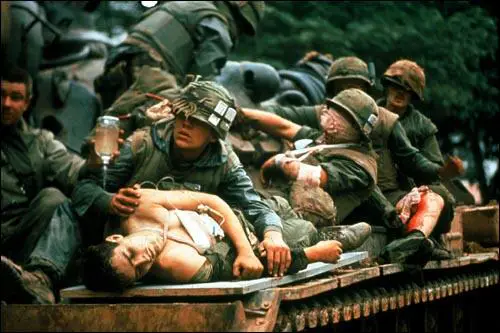Tet Offensive
In September, 1967, the NLF launched a series of attacks on American garrisons. General William Westmoreland, the commander of US troops in Vietnam, was delighted. Now at last the National Liberation Front was engaging in open combat. At the end of 1967, Westmoreland was able to report that the NLF had lost 90,000 men. He told President Lyndon B. Johnson that the NLF would be unable to replace such numbers and that the end of the war was in sight.
Every year on the last day of January, the Vietnamese paid tribute to dead ancestors. In 1968, unknown to the Americans, the NLF celebrated the Tet New Year festival two days early. For on the evening of 31st January, 1968, 70,000 members of the NLF launched a surprise attack on more than a hundred cities and towns in Vietnam. It was now clear that the purpose of the attacks on the US garrisons in September had been to draw out troops from the cities.

ambulence during the battle to recapture Hue during the Tet Offensive.
The NLF even attacked the US Embassy in Saigon. Although they managed to enter the Embassy grounds and kill five US marines, the NLF was unable to take the building. However, they had more success with Saigon's main radio station. They captured the building and although they only held it for a few hours, the event shocked the self-confidence of the American people. In recent months they had been told that the NLF was close to defeat and now they were strong enough to take important buildings in the capital of South Vietnam. Another disturbing factor was that even with the large losses of 1967, the NLF could still send 70,000 men into battle.
The Tet Offensive proved to be a turning point in the war. In military terms it was a victory for the US forces. An estimated 37,000 NLF soldiers were killed compared to 2,500 Americans. However, it illustrated that the NLF appeared to have inexhaustible supplies of men and women willing to fight for the overthrow of the South Vietnamese government. In March, 1968, President Johnson was told by his Secretary of Defence that in his opinion the US could not win the Vietnam War and recommended a negotiated withdrawal. Later that month, President Johnson told the American people on national television that he was reducing the air-raids on North Vietnam and intended to seek a negotiated peace.

